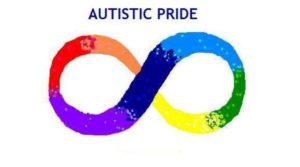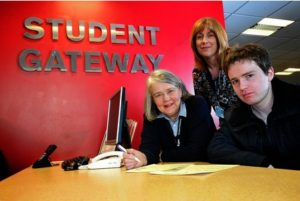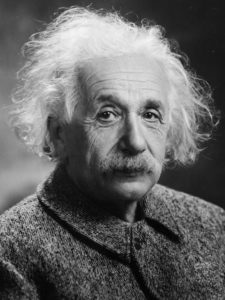Did you know dear reader, June 18th is a very special day for us Autistic people and our families – a special event celebrated around the world, from Brazil, to London to Israel – a day dedicated to celebrating neurodiversity and the unique identity, abilities and culture of autistic people; Autistic Pride Day!

Autistic pride logo
Being autistic myself, I can tell you that Autism is a double-edged sword. Although it certainly does have benefits, practical and personal, to deny that it is a disability would be dismissive of the problems that many Autistic people face. In my own case, there are things that I wish to do that I struggle greatly with. Take social encounters for example – despite making great advances in my life, especially my time at uni, I still struggle terribly when it comes to meeting new people, and still usually make an awful first impression. I can barely hold a conversation, even on subjects I know quite well, and I can’t do small talk to save my life. When a situation arises, I find it very difficult to explain my side of the argument. Had it not been for my DSA-funded mentors at university, I would not have lasted even a week, academic talent or not.
But none of these things mean I am not proud to be autistic; no, far from it. Despite the difficulties my Autism has presented me with, it is the same Autism that has given me the mental capacity, the tools and the mindset needed to cope with the environment that was university. Moreover, it has without question played the most vital role in developing me into the man I am. And I am very, very proud of the man I have become.
To give you more details about the practical benefits of being Autistic, although we only have few interests and hobbies, our interest is often so intense that we can become exceptionally talented within our certain hobbies and attain a vast amount of knowledge about certain subjects. Although my pre-university education grades were woeful (not so much my fault, thank you very much), one thing I always excelled at was writing. Any written work I did was always to standard, but when it was for a subject I particularly enjoyed, for example History, the resulting piece of work was the envy of almost all my classmates, both before and during university. Of course, my Autistic brain was also highly analytical when it was engaged as strongly as it was at university (otherwisemaybe not so much …), which was a tremendous asset when I was researching whatever particular topic I may be writing about, gathering and reviewing evidence, comparing it with a certain hypothesis and coming to a conclusion. At the end of those fine years at university, I graduated with flying colours, just barely missing a first class.

Tom and the Disability Team at DMU
Having also developed a passion for supporting disability welfare in general, I volunteered with many charities, including Havens Hospices, the Samaritans and my personal favourite – Autism Anglia. I worked tirelessly for these charities to conduct interviews, edit videos and write blogs. I wrote the way only a motivated autistic history graduate could, and I enjoyed it. Of course I’ve already told you dear readers about my time as Disabled Student Representative at De Montfort University and founding the Disabled Students’ Society. Two more examples of what someone with Autism can achieve when they put their mind to it. Now, as a Student Consultant with Access2Learn, I get out of bed every morning ready to start work, help other students like me, write blogs, make videos and do a job that means a great deal to me. It can be very hard work, now that A2L supports hundreds of students up and down the country, but I wouldn’t change it for the world. In a stark contrast from when I’m doing boring house chores, or when I was working in my previous job washing dishes in a pub, my motivation was just barely above non-existent.
My autistic brain also helps me perform exceptionally at my hobbies – admittedly mostly video games. An autistic friend of mine, Peter, is a human encyclopaedia of films, having a detailed knowledge of just about every film ever made and everyone who took part in it. Another of my autistic friends, Nathaniel, can talk forever about political issues, history, QI and knows every single detail about Game of Thrones. Finally, there’s Michael, who is currently taking his passion for History with him to London to do a Master’s and maybe even teach it one day. All three of these friends of mine I met at university, where we all did exceptionally well, with Peter even achieving a First Class.
Finally, on a personal level, growing up with Autism has without doubt played the biggest role in developing me into the man I am now. Contrary to what most conventional of autism would have you believe about us being unempathetic, I believe that my experience with Autism has made me more empathetic. I am polite and friendly to everyone I deal with. I detest any form of bullying. I relate to the students I support and can put myself in their position. Truth be told, I wouldn’t be very good at my job as a Student Consultant if I wasn’t empathetic. At the risk of sounding boastful, I am also very strong of mind and character. As a child with autism who was bullied almost to suicide, as sadly many autistic children are – but as someone who refused to give in and demanded something out of life before I went to my grave, I developed an iron will and a sense of character strong as steel. Whether that is necessarily related to Autism as a condition is academic, but as I said before; many autistic people go through Hell at school on account of who they are.
I suppose when it comes down to it, in order for an autistic person to achieve their full potential and demonstrate the full brilliance of the

Albert Einstein – rumoured to have been autistic
autistic brain, we need to be engaged with something that means something to us. A child with Autism can appear to be completely switched off to the world around him/her when at school or out with the parents, but think of Derek Paravicini, who mastered the piano at the age of 2, or Jacob Barnett, who at 14 years old had an IQ even higher than Albert Einstein and was studying a Master’s degree in Quantum Physics. It is rumoured that Einstein himself had Autism, as did Michelangelo. Einstein for one didn’t speak his first words until the age of 4 years old, yet is considered one of the cleverest men to have ever lived. As for myself – when it comes to small talk or any kind of Maths – or something else I find equally boring – I’m totally hopeless. But give me an essay to write on the relationship between nationalism, racism and violence in History, or a blog about autism or being a student, or even sit me down to play Middle Earth: Shadow of Mordor … and you’ll see the true power of an autistic brain as I wrack up a first class grade or a hit streak of 650.
Why am I proud to be Autistic? Although we can be difficult to engage, in social, academic and work terms, when we are engaged in something our drive is like a freight train and our insight and knowledge on the subject at hand can be so deep that by comparison the Marianna Trench looks like a kiddie pool. When Hans Asperger conducted the study around 1944 that elevated understanding of Autism to new levels, he referred to the autistic children he worked with as ‘little professors’ for their ability to talk about their favourite subject in incredible detail, especially for children of that age. Moreover, every single Autistic person is different, always offering a different perspective and a unique talent and personality which shines through when they’re truly engaged. Although various stereotypes exist about Autism, the truth is we are like snowflakes; no two are ever alike.
I am proud to be Autistic because of the sheer volume of potential that I have within me, as does every single soul with Autism. It is my hope to see a system of education and work in place that realises this unique talent instead of squandering it. I am proud to be Autistic because we were made to stand out, to make great contributions to things we care about and subjects we enjoy. I’m proud to share the same condition as such great names as Albert Einstein, Mozart, Temple Grandin and by some accounts Abraham Lincoln and Andy Warhol. I’m proud to be Autistic because, quite frankly, without us … the world would be dreadfully boring ?
